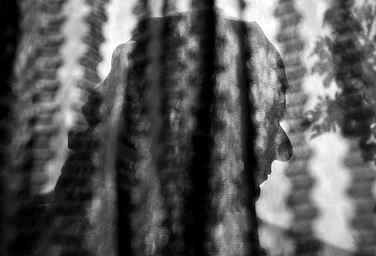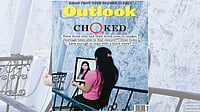It has been three months since my daughter last stepped out, having hurried back home from the city where she studies just in time to beat the nationwide COVID-19 lockdown enforced end-March. Though the stay-at-home has not ended her trademark tantrums, it has definitely put paid to her favourite pastimes such as long drives and dining out. My ability to do things has been severely limited too, including the umpteen coffee breaks in the company of colleagues. Unable to live life the way we are used to, the forced restrictions rankled. Chastised—one word comes readily to my mind when asked what I learned from the pandemic. We have been shown our place, robbed overnight of the simple pleasures. But nothing hurt me more than the suspension of the print edition of Outlook once the country shuttered down.
We had no choice. With state borders closed and all modes of transport and distribution at a standstill, there was no way a physical copy of the magazine could be delivered to its readers. True, some in the business are continuing to claim uninterrupted print publication, but no explanations have yet been forthcoming on how they managed the impossible when the lockdown was at its peak. Unlike newspapers that are city-specific, a magazine needs to be distributed from Kashmir to Kanyakumari and the lockdown posed an obstacle that, for all practical purposes, was insurmountable.
Never given to chest-beating, we instead chose to immerse ourselves with what we do best—persisting with our incisive brand of journalism and delivering it online to our readers unfailingly, week after week. Convinced that substance has more merit than spectacle, Outlook’s journalism never slackened despite the odds. Our reporters, photographers, editors and designers ideated as imaginatively as ever and worked harder in the intervening months, bringing to you issues of the magazine that were both topical and cerebral.
Though there is always scope for improvement, the past few months have been satisfying no less. At a time most delved into what has already been reported, we deliberately charted a different course. Outlook, I have figured out in my two years with the organisation, always thinks out of the box and our recent covers reflected the originality that has come to define us over the years.
Our covers stood out of the clutter, covering facets of the Covid crisis that otherwise were unexplored. From being one of the first to tackle in a big way imponderables such as “Is My Job Safe” to “Losing Sanity” that focused on whether we were losing control over our mind in the midst of the debilitating crisis, we turned our gaze on subjects that gave us hope in a sea of despair. “Thank You Nurse” was one such that gave credit to where it was due—the nurses at the frontline of the coronavirus battle—and sought to reaffirm our trust and faith in the endearing quality of humanity.
It often, of course, took superhuman effort within the prevalent restrictive environment to put together some of our issues. When the media was engrossed with migrants struggling to reach home, our reporters went the extra mile to document what the future lay for those who had returned to the villages. The cover—What After Home?—proved to be a logistical nightmare, particularly when it came to catching up with migrants such as Mohammad Saiyub, who had become a face of the crisis after being photographed with his dying friend in his lap. Many of the returnees were from far-flung areas, including some in quarantine, and reaching out to them required a lot of ingenuity on the part of our reporters. But ‘covided’ as we are—the topic of an imaginative cover on how the virus has fundamentally affected or altered us one way or the other—our team rose to the challenging circumstances as only they can.
And I can vouch there will never be any let-up in either effort or enterprise when it comes to Outlook’s journalism. Topicality being our hallmark, we bring you a cover this week on a topic that has been on everyone’s mind: How’s the josh at our workplaces? With lockdown restrictions being eased and offices opening up, many of us are returning to work after months amidst unprecedented uncertainties. But questions abound. Will our companies survive? Are our jobs safe? What about pay cuts and delayed promotions? Is work from home a better option than working from office?
Outlook commissioned market researcher Toluna to conduct a survey—a first in the country—and the findings on the mood at offices are interesting. For me, though, the best was the revelation that a sizeable section of employees is thrilled working from home because it allows them to stay away from their tyrannical bosses. Well, Outlook staff members are generally continuing to work from home, and I can only hope that it is not me but the coronavirus that is keeping them away. Here’s wishing happy reading.


























